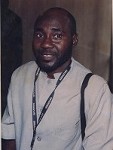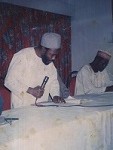Research Africa
Accredited Consulting Service for Mr. Ellams BSc Accredited Senior Consultant (ASC)
The Appleton Greene Accredited Consultant Service (ACS) for Research Africa is provided by Mr. Ellams and provides clients with four cost-effective and time-effective professional consultant solutions, enabling clients to engage professional support over a sustainable period of time, while being able to manage consultancy costs within a clearly defined monthly budget. All service contracts are for a fixed period of 12 months and are renewable annually by mutual agreement. Services can be upgraded at any time, subject to individual client requirements and consulting service availability. If you would like to place an order for the Appleton Greene Research Africa service, please click on either the Bronze, Silver, Gold, or Platinum service boxes below in order to access the respective application forms. A detailed information guide for this service is provided below and you can access this guide by scrolling down and clicking on the tabs beneath the service order application forms.
Bronze Client Service
Monthly cost: USD $1,500.00
Time limit: 5 hours per month
Contract period: 12 months
SERVICE FEATURES
Bronze service includes:
01. Email support
02. Telephone support
03. Questions & answers
04. Professional advice
05. Communication management
To apply – CLICK HERE

Silver Client Service
Monthly cost: USD $3,000.00
Time limit: 10 hours per month
Contract period: 12 months
SERVICE FEATURES
Bronze service plus
01. Research analysis
02. Management analysis
03. Performance analysis
04. Business process analysis
05. Training analysis
To apply – CLICK HERE
Gold Client Service
Monthly cost: USD $4,500.00
Time limit: 15 hours per month
Contract period: 12 months
SERVICE FEATURES
Bronze/Silver service plus
01. Management interviews
02. Evaluation and assessment
03. Performance improvement
04. Business process improvement
05. Management training
To apply – CLICK HERE
Consultant profile
Mr Ellams is an approved Senior Consultant at Appleton Greene and he has experience in customer service, marketing and information technology. He has achieved a Bachelor of Science in Business Administration. He has industry experience within the following sectors: Agriculture; Energy; Oil & Gas; Manufacturing and Telecommunications. He has had commercial experience within the following countries: Nigeria; Senegal and Mauritania, or more specifically within the following cities: Kano; Lagos; Port-Harcourt; Dakar and Noukchott. His personal achievements include: saved nearly USD$5M for a broadcasting company; helped farmers with ICT/Smart Tractors; strengthened an engineering company’s ELP; introduced unmanned generators at a broadcasting company and strengthened a technology company’s aviation communications. His service skills incorporate: marketing research; feasibility reports; audit management; forensic management and turnaround facilitation.
To request further information about Mr. Ellams through Appleton Greene, please CLICK HERE.

Executive summary
Research Africa
Africa is the world’s second-largest and second-most-populous continent. At about 30.3 million km² (11.7 million square miles) including adjacent islands, it covers 6% of earth’s total surface area and 20.4 % of its total land area. With 1.2 billion people as of 2016, it accounts for about 16% of the world’s human population. The continent is surrounded by the Mediterranean Sea to the north, both the Suez Canal and the Red Sea along the Sinai Peninsula to the northeast, the Indian Ocean to the southeast, and the Atlantic Ocean to the west. The continent includes Madagascar and various archipelagos. It contains 54 fully recognized sovereign states (countries), nine territories and two de-facto independent states with limited or no recognition. Algeria is Africa’s largest country by area, and Nigeria by population. In the late 19th century European countries colonized most of Africa. However, most present states in Africa originate from a process of decolonization in the 20th century. African nations have attempted to cooperate through the establishment of the African Union (formerly called the Organization of Africa Unity OAU), which is headquartered in Addis Ababa.
African governments rely heavily on public enterprises to achieve their development goals against the practice in other continents where the private enterprises are the main engine of economic growth and development. Public enterprises are government owned or controlled companies which are supposed to earn the bulk of their revenues from sales, have a distinct legal identity, and are self- accounting. Conservative estimate places the total number of the enterprises at about 3,000. They dominate the economies, account for relatively high percentages of the GDPs, and a high percentages of manufacturing value added. They frequently dominate local capital markets, and their borrowings – and poor performance; have contributed to the growing foreign debt servicing burden of most of the countries in the region. There are many reasons explaining why African states have created and sustained these enterprises. Institutions and predispositions inherited from centralized, interventionist colonial regimes; a tendency to associate liberal capitalism with colonialism and imperialism; the post-war ascendancy of leftist/statist political ideologies; the apparent absence or embryonic nature of the indigenous private sector; the conversion of failing private enterprises into public enterprises to forestall increases in unemployment; the attractiveness of enterprises to politicians who use them as patronage mechanisms to distribute jobs and political good wills – these are but some of the more important historical, economic, social and political factors which have led almost every African state to create a large enterprise sector. The performance of these enterprises has been poor with very low rate of return on the large amount of resources invested in them. Far from contributing to government revenues, these enterprises have more regularly become a heavy burden on already strained budgets. Few of these enterprises generate revenue sufficient to cover operating costs, depreciation and financial charges; a good percentage cannot even cover operating costs. In many instances where these enterprises are classed as profitable, closer examination reveals distorted prices, direct subsidies, hidden transfers, preferential interest rates and a host of other elements which – if properly accounted for – would reduce the paper profits of the enterprise in question. The conclusion is that these enterprises presents a depressing picture of inefficiency, losses, budgetary burdens, poor products and services, and minimal accomplishment of the non-commercial objectives so frequently used to excuse their poor economic performance.
Service Methodology
Grounded theory methodology (GTM) is and will be dominant methodology in use. GTM provides useful tools to learn about individuals’ perceptions and feelings regarding a particular subject area. Quantitative data may be useful in measuring attitudes across a large sample, however, GTM offers a powerful methodological framework if the aim of the study is to learn about individuals’ perceptions. GTM shares the following characteristics with other qualitative methods, which correspond to those of this study: Data collection and analysis in grounded theory: GTM uses a form of purposive sampling, known as theoretical sampling, where participants are selected according to criteria specified by the researcher and based on initial findings. Early analysis of data indicates issues that need exploration; hence the sampling process is guided by the on-going theory development. Data collection and analysis take place in alternating sequences. Coding interviews as part of the analytic process: Interview coding is used to capture what is in the interview data, to learn how people make sense of their experiences and act on them. Coding is the first step of data analysis, as it helps to move away from particular statements to more abstract interpretations of the interview data. Developing categories: After coding several interview transcripts, a researcher can identify many issues that are of importance to the respondents. These issues are also known as phenomena and are assigned a conceptual label to become a code, also known as a concept. Some codes or concepts will share the same or similar characteristics and can be pulled together into more abstract categories, which can typically be interlinked and build the basis for a theory.
Service Options
Companies can elect whether they just require Appleton Greene for advice and support with the Bronze Client Service, for research and performance analysis with the Silver Client Service, for facilitating departmental workshops with the Gold Client Service, or for complete process planning, development, implementation, management and review, with the Platinum Client Service. Ultimately, there is a service to suit every situation and every budget and clients can elect to either upgrade or downgrade from one service to another as and when required, providing complete flexibility in order to ensure that the right level of support is available over a sustainable period of time, enabling the organization to compensate for any prescriptive or emergent changes relating to: Customer Service; E-business; Finance; Globalization; Human Resources; Information Technology; Legal; Management; Marketing; or Production.
Service Mission
From the executive summary, it can be seen how and why Africa is plagued with socio-economics and political problems and why the continent has remained underdeveloped. It is seen that most enterprises are set up for political expediency rather than economic emancipation of the people and they die when the politician(s) concerned leaves office. Even if the enterprise remains, they will not be patronized by the new set of political leaders or government because their mission is not to rescue their people from the grip of economic hardship but create a new economic haven for themselves. The Africa economic situation is quite paradoxical, unless and until political businessmen are replaced by economic businessmen, there will continue to be social-political and economic problems, insurgency will not abate because the people are hungry in the mist of plenty. They can see their brothers in Asia and South-America who were in the same economic platform with them about sixty years ago now exporting goods and services to them. It is hope that through this medium, investors will see, appreciate and tap from the great economic potential that the African continent possesses. It is my hope and believe that this medium will create an opportunity and spur investors to the continent.

Service objectives
The following list represents the Key Service Objectives (KSO) for the Appleton Greene Research Africa service.
- Feasibility Study
A feasibility study is an analysis of the viability of an idea. The feasibility study focuses on helping answer the essential question of “should we proceed with the proposed project idea?” All activities of the study are directed toward helping to answer this question. Feasibility studies can be used in many ways but primarily focus on proposed business ventures. Farmers and others with a business idea should conduct a feasibility study to determine the viability of their idea before proceeding with the development of a business. Determining early that a business idea will not work saves time, money and heartache later. A feasible business venture is one where the business will generate adequate cash-flow and profits, withstand the risks it will encounter, remain viable in the long-term and meet the goals of the founders. The venture can be either a start-up business, the purchase of an existing business, an expansion of current business operations or a new enterprise for an existing business. Feasibility Study outline is provided to give guidance on how to proceed with the study and what to include. How to use, and when to do feasibility study; will help you through the process and help you get the most out of your study. A feasibility study is only one step in the business idea assessment and business development process. A feasibility study is usually conducted after producers have discussed a series of business ideas or scenarios. The feasibility study helps to “frame” and “flesh-out” specific business scenarios so they can be studied in-depth. During this process the number of business alternatives under consideration is usually quickly reduced. During the feasibility process you may investigate a variety of ways of organizing the business and positioning your product in the marketplace. It is like an exploratory journey and you may take several paths before you reach your destination. Just because the initial analysis is negative does not mean that the proposal does not have merit. Sometimes limitations or flaws in the proposal can be corrected. A pre-feasibility study may be conducted first to help sort out relevant scenarios. Before proceeding with a full-blown feasibility study, you may want to do some pre-feasibility analysis of your own. If you find out early-on that the proposed business idea is not feasible, it will save you time and money. If the findings lead you to proceed with the feasibility study, your work may have resolved some basic issues. Also, a market assessment may be conducted that will help determine the viability of a proposed product in a specific marketplace. The market assessment will help to determine the strength, weakness, opportunities and threat (SWOT) to the business. If no opportunities are found, there may be no reason to proceed with a feasibility study and if no threats are found, there shall be every reason to continue with the study. - Forensic Management
Your reputation – with your customers and employees, the public, regulators and other companies – is what keeps you in business and underpins your success. These are what constitutes an entrepreneur’s goodwill and are more valuable than the capital or products. But reputation can be lost with terrifying speed. Hackers steal your data and competitor’s espionage activities greatly impinge on the morals and integrity of a corporate entity. A dispute with your business partner threatens to erode value, an accounting discrepancy undermines market confidence, the press discovers related party transactions in a joint venture, and you need to know the facts immediately. If there’s a problem, you need a speedy explanation and a credible plan to fix it. Remember always, the time tested cliché “prevention is always better than cure”. Knowing where your vulnerabilities are and managing the risks involved is a very strategic aspect of any business. All these require investigation, analysis and assessment of accounts, people, communication, events, data all governed by complex, technical and ever changing rules across multiple jurisdictions. All these anxieties costing you sleep- corruption, fraud, cybercrime, contract disputes, litigation, intellectual property and licensing compliance, insurance claims, regulatory investigations, and so on can be avoided if forensic management is put in place from the onset. - Audit Management
For reasons of profitability, ownership and control of companies have for long been separated. Managing and owning are considered to be two distinct competencies, the return on each of which is likely to be increased by their separation. The separation introduces, however, a risk for conflict of interest between owners and managers, a conflict which cannot cost-less be avoided and which eventually reduces the value of the company. The area for corporate governance is the problem of how shareholders and managers can minimize the loss from the separation. International comparisons reveal that the approaches used to handle the problem differ and that there is consequently a potential for learning by making cross-country comparisons. Auditing and auditors represents one of the tools that shareholders use to control management and to minimize the loss. The auditing process traditionally confines itself to the verification of accounting data and analysis of its compatibility with laws, established regulations and approved practice. Since centuries, Swedish auditors have, however, had the additional task of examining the appropriateness of management decisions and action, the so called management audit, an assignment that has varied in extent and character over time. The role of the Swedish auditors’ in the governance structure has been recognized as being different to solutions chosen in other countries. The Swedish solution has, together with a similar approach in Finland, differed, not only from continental Europe, but also from the rest of the Scandinavian countries. Audit is a vital tool in monitoring a company’s production materials, sales and the overall well-being of a corporate entity from a glance because an audit report will always have its key facts highlighted. - Turnaround Facilitation
Most African companies are setup without a feasibility study because they are not meant to satisfy market or economic needs of the people but political patronage of the promoters. There is hardly any company in Africa that has outlived its promoters or owners. These companies are hurriedly setup and once the politician or political party that patronizes the company is no longer in power or office, that company will die a natural death or through probes and investigations by the new party in power-the opposition. The companies in most cases do not have a definite line of business; they do whatever the government in power wants them to do. They are not open every day and sometimes do not have offices and/or members of staff unless and until their services are needed. Sometimes, so much public funds would have been pumped into it without a corresponding return for such. In this case, the company has to be liquidated or the management changed to bring it up to level when it can broke-even and be on the path of profit making. This is where turn-around experts come in to play, to revitalize or reactivate an ailing business concern. The first thing would be to carry a forensic audit of the company’s books, machineries and equipment, material management and then the general management of the company to identify the area of leakage(s) and give the company a defined line of operation and progression. Thereafter, a feasibility study is done to determine the company’s needs in terms of refinancing and maybe rebranding. Most times what is needed is refinancing and better equipment. These companies can be resuscitated as standalone, merged with existing enterprises or acquired under new ownership. - Market Research
Marketing research is a systematic process that one collects, collates, analyzes and draws conclusions from data gathered from consumers, business owners, or other groups of interest on a specific field of study. There are different types of marketing research and each type has its place in attempting to answer questions and meeting the needs of an organizations. Marketing research can be broken down in many ways. One of the most common is to group research into quantitative versus qualitative methodology. Qualitative research is usually exploratory in nature and is useful for uncovering insights into research questions that may not be well defined or no previous research has been done in the area. Methodologies include focus groups, in-depth one-on-one interviews, observation, etc. Qualitative research is defined by smaller sample sizes (i.e. < 30 respondents). Non-random sample, less structured, open-ended survey design, longer interviews in order to uncover and explore attitudes and perceptions. Results are not projectable to any group or population. Respondents answers to specific topics or questions. Quantitative research is used when there may already be a body of knowledge about the questions or subject-matter. Quantitative research is defined by larger sample sizes (i.e. 100 respondents or more) Random sample (i.e. each respondent has an equal chance of being selected) Structured/formalize/closed-ended survey design Interviews may be as short as a few minutes, or much longer. Results are projectable to a group or population. Custom research, or primary research is where one client bears the total cost of the research and all of the research findings are proprietary to that client. Advantages of this type of research are the proprietary nature of the findings and the ability to customize the questionnaire in order to get the exact findings wanted. The main disadvantage of this type of research is the cost. Syndicated research is when the total cost of the project is shared across multiple clients. The main advantage of this type of research is the lower cost. The main disadvantage of this type of research is the inability to formulate specific questions to address research objectives.

Achievements
Horizon Broadcasting and Telecommunications Limited
I was contracted by Horizon Broadcasting and Telecommunications Limited to help prepare a financial and technical feasibility which was one of the requirements that will enable the company bid for the few regional licenses available in the 3.5 GHz band. The licensing period was staggered in four sessions over a period of three months comprised of licensing application, demand evaluation stage, auction stage and grant stage. I was meant to prepare the application which included the financial feasibility (five year financial projection) and the technical feasibility; I was also to guide the director through the bid processes. It was therefore only necessary that after the grant, I also guided the company through equipment selection. Consequently, I was engaged as a Customer and System Service Engineer to liaise between the marketing team and customers on the one hand and the company and the regulatory agency the Nigerian Communications Commission (NCC) on the other hand. Throughout this period, the company’s main financier was in detection and raising fund was not easy. I introduced the company to a system that will enable the power plant to pick-up within thirty seconds of public power the outing thereby eliminating the need for a technical staff to do night shift with the attendant cost. When the company was making final payments to the vendor, additional five million dollars was built on it. I wouldn’t know if this was a mistake or a deliberate act because the company had two very senior accountants in its employment.
Megatech Engineering Limited
While I was still at Horizon, Megatech Engineering Limited had approached me to help reactivate and strengthen their External Line Plant (ELP); they had actually approached me during the bidding session to serve as their consultant but the message reached me a little too late as I had concluded arrangements to offer my services to Horizon Broadcasting and Telecommunications Limited on full time basis. This time, again their message had come a little too late, I had to oblige their request with some modifications, instead of a full time engagement, I offered to serve on consultancy basis s over a period of six months in the first instance and every one year thereafter. Megatech’s ELP project was a big challenge to me for the following reasons because, the main cable that was used for the project was a dead BICC armored cable that was replaced about five years earlier having been in use for more than thirty-five years, the ELP staff engaged by the company had no professional and the person heading the project team was a graduate of political science while the engineer-in-charge had neither seen nor heard anything about a cable chambers, manhole, hand-hole, cabinet before then, the network had expanded marginally, with faults all over its routes. I took digital photographs of the network and brought in the directors, heads of departments, consultants and other stakeholders to see what was available. Good enough, I also had photographs of good plants to make comparisons with. After discussing extensively for nearly two weeks, it was agreed to replace the cables in phases. Within six months, the company’s ELP was fully strengthened, with minimum complains by subscribers, without spending too much money and without disrupting the subscriber’s services the network was fully up and running. The company was eventually sold but the new owners ran into political and financial crisis with one of them (the main financier) dying. Megatech Engineering also had a regional license like Horizon.
Technology Support Centre
Technology Support Centre was a big lift in my carrier as a Telecommunications and Broadcast Engineer. For the first time, I was doing non-consultancy jobs and answerable to the consultants instead of the other way round. It was very interesting as it afforded me the opportunity of knowing the northern part of Nigeria even better. My bit was very simple this time around as it involved only Civil and electrical installation under the Technology Enabled Learning program. I built V-sat stands with poles where necessary, install the main equipment, wire the classrooms and installed learning equipment for the teachers and students. TSC was a purely an ICT based company and some of the directors had strong links with Horizon Broadcasting and Telecommunications Limited. It was a very rewarding exercise and it afforded me more time to rest and even more money in my pocket.
Huawei Technologies Limited
I came to Huawei by accident. While working with Horizon and specifically when I came to negotiate interconnection with the Nigeria Telecommunications limited, I had met a staff of Huawei who desperately wanted to see the same office at the interconnect office to close a business deal but lacked the technical knowhow to break through. We had all chatted while waiting and since I was first on the list to be interview, I told her not to worry as I was going to speak on her behalf. True to it, after I had closed my deal, I introduce Huawei and told the Officer-in-Charge how the Chinese technology could facilitate interconnection and reduce the waiting time to interconnect the operators to the national network. When I came out, I told the Huawei staff what to expect and how to go about it. She was next to go in and she offered me her business card. About three years later after I left Horizon, Megatech and TSC, I called the number on the Huawei call card and the person at the other end answered and he was the PRO of the company in Nigeria, my name was on the call card with the date we met at NITEL but they did not have my phone number. After introducing myself, I was asked to send my company’s details immediately and within two weeks, I was at the Nigeria College of Aviation Technology to broker a deal which came out very successful.
All Farmers Association of Nigeria (AFAN)
I had written in a local newspaper on how ICT/Smart Tractor from Hello Tractor could aid farmers and accelerate food production. I had several responses asking that I sell the idea to the Federal Government of Nigeria abut I know the way the Civil Service in Nigeria works because I was there for ten years. I knew that I could not possible sell the idea to government unless I had somebody there who was high up and had passion for the job. Today, most people in the Civil Service in Nigeria and indeed, most employees work, not for the passion but the pay. Shortly after, the then minister of agriculture was scheduled to declare open a General Assembly of the All Farmers Association of Nigeria in Kano. I contacted the organizers and I was invited. Since I was not a member of AFAN, my presence was purely observatory. I took, the time to make contacts and sell my bet idea to some of the officials. At coffee break, I was brought before the minister and within five minutes, I had told the minister how ICT could aid farmers and he bought the idea. When the house reconvened, he mentioned that the federal government was going to assist farmers with telephone handsets to enable them have easy access to information that could assist them. That was all! The government released some much money that might have ended in private pockets or bank accounts of those it was not meant for. A few months later, I called some farmers to find out how the system was working only to discover that the whole idea as hijacked by government was a monumental fraud. No data base was created, farmer had no information on how to access or receive information. The farmers felt short-changed and were bitter about it. I was able to bring some into my small network that services them till date. Along the line too, I introduced small cooperative use of Smart Tractors from Hello Tractor of the United States of America to assist them. The Smart Tractor is a durable, versatile motor designed for rugged small plots of land. It comes with eight attachments for land preparation, irrigation, harvest and transport, keeping the machine active throughout the year.
More detailed achievements, references and testimonials are confidentially available to clients upon request.

Industries
This service is primarily available to the following industry sectors:
Agriculture
Farming by whatever name it is called-subsistence, cash crops, poultry, fishery, piggery, and-so-forth is the mainstay of the African economy accounting for nearly 60% of the workforce and about 40% of gross domestic product (GDP). Over the last decade, millions of small families farms in Africa have experience big changes. These farms are the continent’s main source of food, employment, and income. Many African governments are putting agriculture back to the top of the development agenda, and from a growing revenue base, they have increased the proportion of their national budgets going to this vital sector. Private companies have invested heavily in Africa’s agriculture value chains in recent years, paving the way for a renaissance in Africa’s agricultural food systems that multiplies the options for farmers in terms of the seeds they plant, the fertilizers they use, the markets available to them, and the information services now available to help them manage their farming activities. Agricultural growth in Africa has also expanded livelihood opportunities for millions of people now engaged in the growing off-farm stages of the agricultural food system. Offering a glimpse of future success, these advances have helped inspire a new vision for Africa, one in which farming realizes its potential to help make the continent sustainable and hunger free. Much more must be done to sustain and deepen the agricultural transformation process that has started. The continent is still faced with many challenges such as food insecurity; climate change and rampant land degradation. Population growth and rising urbanization has increased the pressure on agriculture to deliver more and better food. But each of these challenges also represents an opportunity to strengthen agriculture, turning it into a multiplier of inclusive economic growth. While acknowledging the progress that many countries have made toward this end, especially the ones that were quick to embrace the African Union’s Comprehensive African Agriculture Development Program, the report minces no words about how much farther these countries and others have to go.. Farmers across Africa need better access to finance, markets, and an enabling policy environment that affords them the social protections many of us across the world take for granted. These glimpses of success offer an inspiring new vision of a future Africa in which farming as a struggle to survive gives way to farming as a business that thrives. The process by which an agricultural -food system transforms over time from being subsistence-oriented and farm-centered into one that is more commercialized, productive, and off-farm centered is taking place in Africa. Much more remains to be done to sustain these gains and truly drive the agricultural transformation needed for Africa’s development, and to ensure a better life for its entire people. Agribusiness is Africa’s untapped goldmine and a major potential for economic growth and development.
Energy
Energy is a very scarce commodity in Africa. Annual consumption is about 520 KWh in Sub-Saharan Africa, the same amount of electricity used by individuals in advance economies of Europe and America in 25 days. Only about 10% of individuals have access to public power supply, and of those, 75% come from the richest two quintiles in overall income. Less than 2% of the rural populations of Malawi, Ethiopia, Niger, and Chad have access to electrical power. Electrical provisioning in Africa has generally only reached wealthy, urban middle class, and commercial sectors, bypassing the region’s large rural populations and urban poor. According to the forum of Energy Ministers of Africa; most economic activities still rely primarily on humans and animals for energy input. The electrical industry in Africa faces the economic paradox that raising prices will prohibit access to their services, but that they cannot afford to roll out additional infrastructure to drive prices down and increase access without additional capital. Overall rates of access to energy in Africa have held constant since the 1980s, while the rest of the developing world has seen electrical grid distribution increase by 20%. Sub-Saharan Africa is the only region in the world where per-capita access rates are falling. According to recent trends, over 60% of Sub-Saharan Africans will still lack access to public power supply by 2020. Interestingly, Africa’s most abundant natural resources is sunlight. Most parts of sub-Saharan Africa enjoy more than 300 days of free nature-given sunlight every year. Still, over 600 million people on the continent, especially in rural areas, don’t have access to reliable power supply. In most cities and towns, power outages are the norm and people often have to rely on noisy and air-polluting petrol/diesel driven generators for their power supply. Solar energy is free, absolutely clean and abundant. And it provides the best alternative for people in remote parts of the continent who are out of reach of public power supply.
Engineering
Engineering is a very important factor in manufacturing just like power and land, especially where fast production is envisaged. Africans and children of Africa descent have made great strides and are making great strides in the sciences and technology in Europe, America, and indeed all over the world. In spite of these strides, there are very few companies offering engineering services and indeed anything that has to do with science and technology in Africa. Most of the Universities and Polytechnic produce graduates in the liberal arts, humanities and social-sciences. This is in spite of the great strands Africans made in the sciences at the beginning of civilization. Today, African scholars have won prizes in the liberal arts and humanities, but not so much in the sciences and technology. Engineering services are restricted to installations, maintenance and in very few cases, fabrication of spares and parts. The reasons for this includes the fact that there are not enough science and technical curricular in our schools system, there are not enough science, technical and vocational schools, the few available ones are starved of funds and instructional materials. African engineers tend to short-charge their clients. They either use inferior material for work or don’t align their works properly, and their work is always more expensive than imported ones which are superior in quality too. This makes the demand for foreign products and even maintenance inevitable with all the attendant problems of time and demand for foreign exchange. The other major problem of engineering companies is the inadequacy of public power supply. The few engineering companies that exist in the continent today are responsible for at least 60% of their energy need thereby raising the cost of services. Any investment in engineering services in anywhere within the continent is sure of quick return on investment.
Manufacturing
Manufacturing in Africa is hampered by inadequate power supply, lack of basic engineering infrastructure and instability in governance resulting in policy summersault. There is also the problem of insurgency and the twin-evil of multifaceted taxation and foreign exchange regime. However, the rebasing of Nigerian GDP in 2014 revealed that the country was actually experiencing an industrial renewal. With the new computations, the share of manufacturing industries in GDP sharply increased from 2.4% in 2008 to 9% in 2015. Given the predominance of the Nigerian economy in the West African sub-region, these recent developments reflect an increased contribution of non-extractive industries in the entire region. This industrial renewal has since given way to economic recession since the change of government in Nigeria in 2015. Apart from a sharp decline in public power supply, Nigeria’s overdependence on oil manifested in decline of economic activities with the resultant effect of near collapse of the economy. Nigeria’s foreign earning is 60% dependent on oil and once there is variation in the cost of crude oil at the spot market, it will have a marginal effect on the economy and since Nigeria is the biggest economy in West Africa, all the countries in the region will be affected. Attention is however gradually shifting to agriculture and solid minerals.
With Nigeria, the share of manufacturing industry in the regional GDP increased from 5.9% in 2005 to nearly 9% in 2015. However, when excluding Nigeria, that share decreases from 11.2 % to 8.5% over the same period. In other words, the rest of the region is experiencing an industrial decline. Indeed, by volume, the share of industrial value-added has been increasing in the region, from 12 billion in 2005 to nearly 20 billion in 2015 (2000 constant prices). However, apart from Nigeria, where GDP rebasing reversed the trend, industrial growth is much lower than that of other sectors. Without Nigeria, the manufacturing sector in West Africa recorded an average annual growth of only 2%, compared to an overall economic growth of 5% of GDP. In comparison, the services sector recorded an average annual growth of 12%, driven mainly by trade, transportation, telecommunications and financial services. The boom in services (of which contribution to the regional GDP increased from 29.3% in 2005 to 51.6% in 2015), coupled with the importance of the agricultural sector (22.6% of regional GDP in 2015), has resulted in an imbalance in the structure of the regional economy where manufacturing can be seen as the missing link between agricultural and services activities. This translates into a strong external dependence for manufactured goods, which represent on average 46% of the West African imports according to WTO (2015). The trade balance for these goods reports a wide deficit on a regional scale, which penalizes not only economies but importantly the people, who shoulder the costs of importing consumer goods, therefore paving the way to the expansion of poor quality and low cost products in the regional markets. In addition to narrowing its trade deficit, industrialization would be beneficial to the region for several reasons. First, economic diversification would help consolidate the economies within the region, which remain vulnerable to commodity price volatility. Second, low productive capacities deprive the region of spill-overs resulting from industrial development, such as jobs and enterprises creation, increased foreign investment, transformation of the informal sector, technology dissemination, and increased exports. For now, the lack of manufacturing industries leads to significant losses, as shown with the case of cocoa: West Africa produces and exports 65% of cocoa beans in the world, but because it does not process it into chocolate and only garners between 3.5% and 6% of the final price of a chocolate bar. Countries of the region need to remove the obstacles to industrialization to reverse this trend. This will include strengthening domestic and foreign investments. Paying attention to the lack of adequate public transportation and logistics infrastructures, industrial facilities, and energy shortages. Inadequately qualified workforce for industrial jobs, lack of access to finance, and uncompetitive business environment should be tackled headlong. They must build together a productive space and a sizable regional market through common policies focused on standard convergence, free circulation of goods and persons, financial integration, and human capital formation. These must be designed so as to strategically position the region within the global industrial landscape, which offers numerous opportunities but is ruled by more and more complex determinants of competitiveness.
Telecommunications
Africa can no longer be considered the dark continent. For nearly twenty-five years now, and maybe in another thirty years, Africa will remain the place of massive growth in the field of Telecommunications and Information Communications Technology. Till date, the continent remains the target of western mobile operators and over the next few years. They want to expand beyond their highly penetrated home markets. Africa is no longer an uncharted territory. The continent in general, has room for stellar growth. That growth will not come from voice alone, mobile data growth is expected to be higher in Africa than any other region over the next few years. In many Africa countries, this growth will be from an extremely low base. In fact, Africa is already the test bed for some innovative services including mobile banking and cost-free roaming. There is a lot of growth potential in Africa, occasioned by low penetration level; Even as figure of users are high the bulk of the users are in the main urban areas where some subscribers own more than three SIM cards or as many SIM cards as the number of operators operating in the country or continent. Till date, and with more three hundred million registered SIM card, many people in the rural areas have no access to basic telephony due to non-availability of network or public power supply or both. In spite of these glaring limitations, Africa remains the major hub for telecommunication operators and equipment vendors for some time to come.
Africa is currently the second fastest growing market for mobile phones, after Asia. However, the first wave of Africa’s mobile phone revolution is almost over. These days, African consumers are looking to upgrade from ‘first generation’ feature phones to smartphones. It’s no surprise that the continent’s growing population of technology and fashion-savvy youth now presents a multi-billion dollar market for smartphones. However, most ‘new-age’ smartphone devices like iPhone, Blackberry and Samsung are quite expensive for the average African. This has created a huge opportunity for low-priced smartphones that are now hitting the African market. Better still, many of these smartphones are built on the Android operating system, have similar features to the ‘high end’ smartphones and most are just as stylishly designed. In the last eighteen months, over a dozen low-priced smartphone brands have debuted on the African market. Given the market potential for these phones, they’ll very likely make more millionaires for the entrepreneurs behind them.
Locations
This service is primarily available within the following locations:
Kano NG
Kano is the capital of Kano State in North-West, Nigeria. It is situated in the Sahelian geographic region, south of the Sahara. Kano is the commercial nerve center of Northern Nigeria and is the second largest city in Nigeria, after Lagos. The Kano metropolis initially covered 137 square kilometers (53 square miles), and comprised six local government areas (LGAs) — Kano Municipal, Fagge, Dala, Gwale, Tarauni and Nasarawa; However, it now covers two additional LGAs — Ungogo and Kumbotso. The total area of Metropolitan Kano is now 499 square kilometers (193 square miles), with a population of 2,828,861 as of the 2006 Nigerian census. The principal inhabitants of the city are the Hausa people. As in most parts of northern Nigeria, the Hausa language is widely spoken in Kano. The city is the capital of the Kano Emirate. The current emir, Muhammadu Sanusi II, was enthroned on 8 June 2014 after the death of Alhaji Ado Bayero, the thirtieth emir of Kano, on Friday, 6 June 2014. The city’s Mallam Aminu Kano International Airport, the main airport serving northern Nigeria, is named after a politician, Mallam Aminu Kano.
Lagos NG
Lagos is the commercial headquarter of Nigerian and political capital of Lagos state. The city, with its adjoining conurbation, is the largest in Nigeria, as well as on the African continent. It is one of the fastest growing in the world, and also one of the most populous urban agglomerations. Lagos is a major financial center in Africa; the megacity has the highest GDP, and also houses one of the largest and busiest ports on the continent. Lagos, the capital of Nigeria since its amalgamation in 1914, went on to become the capital of Lagos State after its creation. However, the state capital was later moved to Ikeja in 1976, while the federal capital also moved to Abuja in 1991. Even though Lagos is still widely referred to as a city, the present day Lagos, also known as “Metropolitan Lagos”, and officially as “Lagos Metropolitan Area” is an urban agglomeration or conurbation, consisting of 16 LGAs, including Ikeja, the state capital of Lagos State. This conurbation makes up 37% of Lagos State’s total land area, but houses about 85% of the state’s total population. The exact population of Metropolitan Lagos is disputed; In the 2006 federal census data, the conurbation had a population of about 8 million people. However, the figure was disputed by the Lagos State Government, which later released its own population data, putting the population of Lagos Metropolitan Area at approximately 16 million. As at 2015, unofficial figures put the population of “Greater Metropolitan Lagos”, which includes Lagos and its surrounding metro area, extending as far as into Ogun State, at approximately 21 million.
Port-Harcourt NG
Port-Harcourt is a Mayoralty and the capital of Rivers State, South-South, Nigeria. It lies along the Bonny River and is located in the Niger Delta. As of 2016, the Port Harcourt urban area has an estimated population of 1,865,000 inhabitants, up from 1,382,592 as of 2006. The area that became Port Harcourt in 1912 was before that part of the farmlands of the Diobu village group of the Ikwerre people. The colonial administration of Nigeria created the port to export coal from the collieries of Enugu located 243 kilometers (151 mi) north of Port Harcourt, to which it was linked by a railway called the Eastern Line, also built by the British. In 1956 crude oil was discovered in commercial quantities at Oloibiri, and Port Harcourt’s economy turned to petroleum when the first shipment of Nigerian crude oil was exported through the city in 1958. Through the benefits of the Nigerian petroleum industry, Port Harcourt was further developed, with aspects of modernization such as overpasses, city blocks and taller more substantial buildings. Oil firms that currently have offices in the city include Royal Dutch Shell and Chevron. There are a number of institutions of tertiary education in Port Harcourt, mostly government-owned. These institutions include, Rivers State University of Science and Technology, University of Port Harcourt, Rivers State College of Arts and Science, Ignatius Ajuru University and Rivers State College of Health Science and Technology. The current Mayor is Soni Sam Ejekwu. Port Harcourt’s primary airport is Port Harcourt International Airport, located on the outskirts of the city; the NAF base is the location of the only other airport and is used by commercial airlines Aero Contractors and Air Nigeria for domestic flights.
Dakar SN
Dakar is the capital and largest city of Senegal. It is located on the Cap-Vert peninsula on the Atlantic coast and is the westernmost city in the Old World as well as on the African mainland. The city of Dakar proper has a population of 1,030,594, whereas the population of the Dakar metropolitan area is estimated at 2.45 million. The area around Dakar was settled in the 15th century. The Portuguese established a presence on the island of Gorée off the coast of Cap-Vert and used it as a base for the Atlantic slave trade. France took over the island in 1677. Following the abolition of the slave trade and French annexation of the mainland area in the 19th century, Dakar grew into a major regional port and a major city of the French colonial empire. In 1902, Dakar replaced Saint-Louis as the capital of French West Africa. From 1959 to 1960, Dakar was the capital of the short-lived Mali Federation. In 1960, it became the capital of the independent Republic of Senegal. Dakar is home to multiple national and regional banks as well as numerous international organizations. From 1978 to 2007, it was also the traditional finishing point of the Dakar Rally.
Nouakchott MR
Nouakchott derived from Berber word; Nawaksu meaning (“place of the winds”) is the capital and largest city of Mauritania. It is one of the largest cities in the Sahara. The city also serves as the administrative and economic center of Mauritania. Nouakchott was a small village of little importance until 1958, when it was chosen as the capital of the nascent nation of Mauritania. It was designed and built to accommodate 15,000 people, but droughts and increasing desertification since the 1970s have displaced a vast number of Mauritanians who resettled in Nouakchott. This caused massive urban growth and overcrowding, with the city having an official population of just under a million as of 2013. The resettled population inhabited slum areas under poor conditions, but the living conditions of a portion of these inhabitants have since been ameliorated. The city is the hub of the Mauritanian economy and is home to a deep-water port and one of the country’s two international airports. It hosts the University of Nouakchott and several other more specialized institutes of higher learning.
Clients
This service’s current clients or employers include:
Horizon Broadcasting & Telecommunication Limited
Horizon Broadcasting & Telecommunication Limited is a regional Fixed Wireless Access (FWA) Operator in the 3.5GHz band Operator. FWA is also known as Radio Free Access or Wireless in the Local Loop, is the use radio technology to provide the so-called last mile connection between users and the core telecommunications network. Broadly speaking, there are two forms of FWA systems viz- narrow and broadband distinguished by the data rates they offer. It is expected that FWA will be capable of offering Voice telephony, Video, and Data service. Horizon deployed the Navini Wirelesss system which is based on Universal Mobile Telecommunications system (UMTS), a 3GPartnership Project. The aim was to introduce IP multi-media service, Integration of data and voice services, Differentiate and guarantee quality of systems. The elements that are known to us are Time Division Multiple Access-TDMA, Code Division Multiple Access-CDMA and Global System for Mobile Communications-GSM Service management. To achieve this, Navini has three inbuilt elements that are not available in similar products and are not found in any standard in use. These elements are multi-carrier synchronous beam-forming,-MCSB, Time Division Duplex –TDD, and Frequency Division Duplex, thus Horizon Broadcasting and Telecommunications limited became the first company to introduce WiMAX in Africa on March 5th, 2005.
Megatech Engineering Limited
Megatech Engineering Limited is a regional Fixed Wireless Access (FWA) Operator in the 3.5GHz band Operator. FWA is also known as Radio Free Access or Wireless in the Local Loop, is the use radio technology to provide the so-called last mile connection between users and the core telecommunications network. Broadly speaking, there are two forms of FWA systems viz- narrow and broadband distinguished by the data rates they offer. It is expected that FWA will be capable of Voice telephony, Video, and Data service. Unlike Horizon that chooses to use all radios to extend the last mile, Megatech’s choice was a combination of Radio, Optic Fiber Cable and copper wire hence their services were in high demand by both corporate and individual bodies. For the radio, Prime wave 2000TM was the choice. The Prime wave 2000fixed wireless access system is based on the application of L-3 Communications Synchronous Code Division Multiple Access (S-CDMA) technology to provide a robust wireless point-to-multipoint radio link from a carrier’s point of presence to multiple end user premises, while on the cable side, fiber is run to a neighborhood serving node where it is connected to individual houses or offices using copper wire.
Technology Support Center (TSC)
Technology Support Center is one of the fastest growing Information Technology Company in Nigeria since inception in 2001 with tremendous turnover since the period of her emergence in the ICT business. We have attained a certain level of confidence through our excellent performance and after sales support. Technology Support Center is an ICT company that offers services to both private and public enterprises. We deploy Hardware & Software Tailored Solutions that address Security, Network, Storage, Backup Solutions, Data Protection and Recovery, Virtualization, Data Center Solutions, ICT Training & Education Services and a host of other ICT needs. Our Team is comprised of trained and qualified IT professionals with various Certifications to enable effective and efficient delivery of IT Projects and services to our esteemed Customers. We work closely with our Global partners and we deploy the best international business standards in our mode of operations. The Source Computers’ Management team shares a belief that value is most important to all our Customers, therefore we will continuously make a difference in the delivery of our solutions to meet our Customers’ needs and demands.
Huawei Technologies Limited
Huawei’s products and services are available in more than one hundred and seventy (170) countries, and are used by a third of the world’s population, raking third in the world in mobile shipment in 2015. Sixteen R & D centers have been setup in the United States, Germany, Sweden, Russia, India and China. Huawei Consumer BG is one of Huawei’s three business units and covers smartphones, PC and tablets, wearable and cloud services etc. Huawei’s global network is built on 20years expertise in the telecom industry and is dedicated to delivering the latest technological advances to consumers around the world. Huawei Consumer Business Group (BG) shares its vision with people who pursue their dreams, people who are visionary challengers, and people who are proactive with a strong belief in striving to achieve their goals. We are dedicated to bringing the latest technology to consumers and creating extraordinary experiences for people everywhere. Huawei Consumer Business Group (BG) is committed to focusing on premium products, differentiating innovation, achieving technological breakthroughs, bringing the latest technology to consumers and striving to realize dreams for people everywhere. Committed to offering the best products to consumers all over the world, Huawei Consumer BG provides a range of products, including the D-series for the “Ultimate Technology”; the P-series for the “Ultimate Fashion”; the G-series for the “Ultimate Value” and the Y-series for the “Ultimate Accessibility”.
Huawei Technologies Limited – Click Here
All Farmers Association of Nigeria (AFAN)
AFAN is an association for farmers in Nigeria. It is made-up of what is referred to as commodity associations. The commodity associations are formed based on the commodity a farmer produces. The commodity could be maize, cassava poultry, oil palm, snails etc. Thus under the AFAN you have members of commodity associations such as Snail Farmers’ Association, Poultry Farmers’ Association to mention a few. These commodity associations meet in groups at agreed dates. However, once a month they all come together under the AFAN umbrella to discuss matters related to the progress of the farmers.

Benefits
Customer Service
- Availability
- Proactive service
- 24/7 attention
- Customer satisfaction
- Advance information
- Personal touch
- Market analysis
- Compensative competitive
- Zero complaints
- All rewarding
Marketing
- Diligent survey
- Information collation
- Diligent analysis
- Accurate projections
- Social effects
- Market identification
- Product marketing
- Financial projections
- Political effects
- Economic effects
Information Technology
- Leadership
- Management
- Easy Audit
- Technology works
- Business thinking
- Architecture planning
- Informed buying
- Relationship building
- Contract monitoring
- Contract facilitation
Bronze Service
Monthly cost: USD $1,500.00
Time limit: 5 hours per month
Contract period: 12 months
Bronze service includes:
01. Email support
02. Telephone support
03. Questions & answers
04. Professional advice
05. Communication management
SERVICE DESCRIPTION
The Bronze Client Service (BCS) for Research Africa provides clients with an entry level option and enables client contacts to become personally acquainted with Mr. Ellams over a sustainable period of time. We suggest that clients allocate up to a maximum of 5 Key Employees for this service. Your Key Employees can then contact the consultant via email, whenever they feel that they need specific advice or support in relation to the consultant’s specialist subject. The consultant will also be proactive about opening and maintaining communications with your Key Employees. Your Key Employees can list and number any questions that they would like to ask and they will then receive specific answers to each and every query that they may have. Your Key Employees can then retain these communications on file for future reference. General support inquiries will usually receive replies within 48 hours, but please allow a period of up to 10 business days during busy periods. The Bronze Client Service (BCS) enables your Key Employees to get to know their designated Appleton Greene consultant and to benefit from the consultant’s specialist skills, knowledge and experience.
Silver Service
Monthly cost: USD $3,000.00
Time limit: 10 hours per month
Contract period: 12 months
Bronze service plus
01. Research analysis
02. Management analysis
03. Performance analysis
04. Business process analysis
05. Training analysis
SERVICE DESCRIPTION
The Silver Client Service (SCS) for Research Africa provides more time for research and development. If you require Mr. Ellams to undertake research on your behalf, or on behalf of your Key Employees, then this would understandably require more time and the Silver Client Service (SCS) accommodates this. For example, you may want your consultant to undertake some research into your management, performance, business, or training processes, with a view towards providing an independent analysis and recommendations for improvement. If any research and development, or business analysis is required, then the Silver Client Service (SCS) is for you.
Gold Service
Monthly cost: USD $4,500.00
Time limit: 15 hours per month
Contract period: 12 months
Bronze/Silver service plus
01. Management interviews
02. Evaluation and assessment
03. Performance improvement
04. Business process improvement
05. Management training
SERVICE DESCRIPTION
The Gold Client Service (GCS) for Research Africa is intended for more detailed evaluation and assessment, that may require your Key Employees to have monthly meetings or interviews with Mr. Ellams. These meetings and interviews can be conducted over the telephone, Skype, or by video conference if required. The consultant can also attend your business premises, an Appleton Greene office, or another mutually beneficial location, but please note that clients are responsible for the costs of any disbursements separately, including travel and accommodation. This service enables you to integrate the specific skills, knowledge and experience of your designated consultant into your Key Employee management team. The Gold Client Service (GCS) can also incorporate training workshops, business presentations and external meetings with customers, suppliers, associations, or any other business-related stakeholders.
Platinum Service
Monthly cost: USD $6,000.00
Time limit: 20 hours per month
Contract period: 12 months
Bronze/Silver/Gold service plus
01. Project planning
02. Project development
03. Project implementation
04. Project management
05. Project review
SERVICE DESCRIPTION
The Platinum Client Service (PCS) for Research Africa is our flagship service and will be required if you need Mr. Ellams to facilitate the planning, development, implementation, management, or review of a particular project relating to his specialist subject, which would obviously require more time and dedication. This service enables you to reserve up to 12.5% of the consultant’s working month and provides a more hands-on service as and when required. If you need more time than this, then this can always be arranged, subject of course to the consultant’s ongoing availability. The benefit of having an external consultant involved in projects is they provide an independent perspective and are not influenced by internal politics, day-to-day responsibilities, or personal career interest. They provide objectivity, specific knowledge, skills and experience and will be entirely focused upon the tasks at hand. The Platinum Client Service (PCS) will provide your organization with a valuable resource as and when you need it.




































